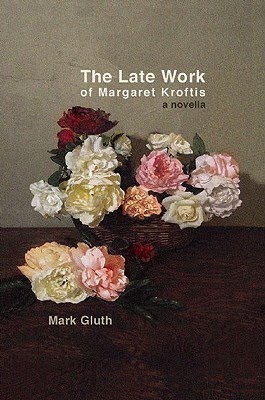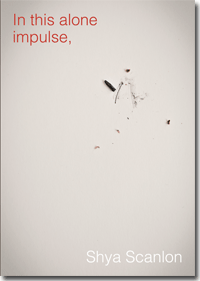Blake Butler
http://www.gillesdeleuzecommittedsuicideandsowilldrphil.com/
Blake Butler lives in Atlanta. His third book, There Is No Year, is forthcoming April 2011 from Harper Perennial.
http://www.gillesdeleuzecommittedsuicideandsowilldrphil.com/
Blake Butler lives in Atlanta. His third book, There Is No Year, is forthcoming April 2011 from Harper Perennial.
 ONE DAY ONLY: In conjunction with Obama’s State of the Union Address tonight (9 pm EST), Wave Books is offering a supreme discount on the REAL address: STATE OF THE UNION: 50 POLITICAL POEMS, featuring poems by 50 contemporary poets (John Ashbery, Anselm Berrigan, Lucille Clifton, CAConrad, Peter Gizzi, Albert Goldbarth, Terrance Hayes, Fanny Howe, Tao Lin, Eileen Myles, Michael Palmer, Wang Ping, Richard Siken, Juliana Spahr, James Tate, Catherine Wagner, Joe Wenderoth, Dara Wier, Rebecca Wolff, John Yau and many more). $5 for a softcover edition, available only through the Wave website here.
ONE DAY ONLY: In conjunction with Obama’s State of the Union Address tonight (9 pm EST), Wave Books is offering a supreme discount on the REAL address: STATE OF THE UNION: 50 POLITICAL POEMS, featuring poems by 50 contemporary poets (John Ashbery, Anselm Berrigan, Lucille Clifton, CAConrad, Peter Gizzi, Albert Goldbarth, Terrance Hayes, Fanny Howe, Tao Lin, Eileen Myles, Michael Palmer, Wang Ping, Richard Siken, Juliana Spahr, James Tate, Catherine Wagner, Joe Wenderoth, Dara Wier, Rebecca Wolff, John Yau and many more). $5 for a softcover edition, available only through the Wave website here.
The very generous Brad Green has offered to award a copy of Molly Gaudry’s We Take Me Apart to an HTML Giant reader of choice. Because the book is so persuasive in the way it links childhood space with food and movement of time, comment with a food that evokes some long memory of yours. A selected winner gets the book late tomorrow evening.
 Finally having got a hold of the beautiful latest issue of Fence, I was struck–[before being struck by the words of the pieces, as usual, and by their new colored layout on the page in this issue in a combo of blue/black/gray that I wish more publications would take on]–in reading Rebecca Wolff’s editor’s note. The note concerns itself mainly with an email that she received about an announcement for Brandon Downing’s brand new, and by and large tough to nail down, Lake Antiquity.
Finally having got a hold of the beautiful latest issue of Fence, I was struck–[before being struck by the words of the pieces, as usual, and by their new colored layout on the page in this issue in a combo of blue/black/gray that I wish more publications would take on]–in reading Rebecca Wolff’s editor’s note. The note concerns itself mainly with an email that she received about an announcement for Brandon Downing’s brand new, and by and large tough to nail down, Lake Antiquity.
The emailer was bitching at Ms. Wolff for calling the book ‘indescribable’ and then simultaneously going on to try to describe it. The emailer apparently thought the book wasn’t as indescribable as she thought it was, and gave his take on how she should have described it. Bitching at her for being in awe of something, and not knowing exactly how to say why. She responds and then takes the consideration of the person’s email as a chance to open up the consideration of her editorial stance, which struck me as so right and crucial that I am going to copy the heart of it right here:
As a publisher, I often find myself in the position of ushering texts into the world that are, frankly, over my head in terms of their erudition or the richness of the literary-historical medium in which they grew–most of the poets I publish have read more than I have, and my appreciation of their work is made up of some combination of savvy (“this work is smart, and, in its position in the literary landscape, is something I feel comfortable being connected to”), curiosity (“I will learn something through the process of putting this book out in the world”), and whatever one calls the kind of literary/aesthetic appreciation that happens DESPITE or IN SPITE OF a kind of glancing or even glib awareness of the aforementioned richesses.
Thank god. A publisher of renown, with a backlog of amazing publications, who understands and can be plain about the idea that an editor, publisher, whoever, need not understand the full breadth or even the full context of the body of work they help bring into the light–beyond simply knowing that it is something of power, worth spreading. If there is anything that plagues the magazine and book publishing industry, it is too wide a margin of people denying that which they do not understand, or can encapsulate, and thereby disallowing themselves to be altered or even expanded by the work, in working harder at it, in letting it open up around them. Is this not what we read for? Is this not what we write for? Are books just another mode of entertainment, continuity, or are they meant to do something more?
This is why many magazines are dying. In something as often ephemeral as an issue of a magazine, why shouldn’t more chances be taken? In something as historically struck as publishing a book, why shouldn’t it be something that lives beyond its grasp? So many magazines and publishers fail financially because first they fail to enthrall, because their contents are bound in breadth enough that they are forced to compete for attention by things like movies, and often wheel around the elements that make text capable of approaching, creating space untouchable by another medium.
If only more editors would be more frank and open and willing to open the gates some, to smudge lines and make things that we can take beyond mere emotional responses and momentary pleasures, and instead create a body that more often interacts on the level of the unnamable, the waking, the eat. The day there are no objects left that we do not understand is the day we begin only ever getting smaller, dumber. Bodies in a stall.
>>>>>> Intuition over containment.
>>>>>>> Prowess over cake.
>>>>>>>>>>> Resonance over immediacy.
>>>>>>>>> ‘What the fuck’ over ‘Oh, neat.’
Pick up the new issue to read the thing in full, it’s worth the price alone, not to mention a ton of other magick words.
Bravo Rebecca. I want to have your kind of fun, too.
You can now purchase Unsaid 4 online. It’s seriously a monolith: a 500 pp. issue I go back to and back to like a textbook.
 Brand new from Dennis Cooper’s Little House on the Bowery imprint of Akashic Books is a fantastic short novella by Mark Gluth, titled The Late Work of Margaret Kroftis. As with all the books on Little House, there is a certain air of magic, maze-making, language-play, and reinvention to be expected in those titles, and Gluth’s amazing webcomb of image and memory-tricks is certainly no exception. Reading this book it felt aurally pleasant in a way of great refreshment, with mirror time worming and layers of photography and weaving of levels of consciousness and continuity, all in very brief, clean sentences; a beautiful package with one of the most memorable endings I’ve read in a while. Feels of classical short French writing but in modern American scenery, which I can’t remember having happened in other books. A lot of people I will know will really like this.
Brand new from Dennis Cooper’s Little House on the Bowery imprint of Akashic Books is a fantastic short novella by Mark Gluth, titled The Late Work of Margaret Kroftis. As with all the books on Little House, there is a certain air of magic, maze-making, language-play, and reinvention to be expected in those titles, and Gluth’s amazing webcomb of image and memory-tricks is certainly no exception. Reading this book it felt aurally pleasant in a way of great refreshment, with mirror time worming and layers of photography and weaving of levels of consciousness and continuity, all in very brief, clean sentences; a beautiful package with one of the most memorable endings I’ve read in a while. Feels of classical short French writing but in modern American scenery, which I can’t remember having happened in other books. A lot of people I will know will really like this.
Immediately after reading, I contacted Mark and talked to him some about the book, his process, language making, and so on. Our interaction follows, and I believe will make you, if you don’t already, want to get a hold of his beautiful text glyph.
Don’t forget this Thursday at 9 PM Eastern time marks the kickoff of our monthly online live reading series, Live Giants!, featuring Heather Christle, author of The Difficult Farm, live from her home in Atlanta. More info at RSVP at Facebook.
 Shya Scanlon’s much anticipated In This Alone Impulse is now available for preorder from Noemi Press. “If Gertrude Stein ran track for Mineola Prep, she’d text these alert, convival poems from the team bus.” — Joyelle McSweeney
Shya Scanlon’s much anticipated In This Alone Impulse is now available for preorder from Noemi Press. “If Gertrude Stein ran track for Mineola Prep, she’d text these alert, convival poems from the team bus.” — Joyelle McSweeney
Nice interview with Laura Sims about her new book Stranger from Fence Books @ Coldfront.
“Do you think pop art is…”
“No.”
“What?”
“No.”
“Do you think pop art is…”
“No… no, I don’t.”
“Why did you leave commercial art?”
“Uhhh, because I was making too much money at it.”
For god’s sake, “thought to myself” is a redundancy. Can that stop? In terms of personal irritation, it’s just as bad, if in an opposite way, as saying, “Want to come with?”